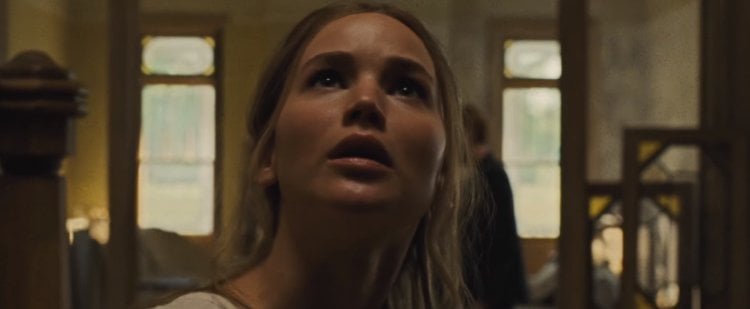mother!

A beautiful young woman (Jennifer Lawrence) in virginal white makes a sexual advance that is rejected by her older husband (Javier Bardem). She's trying to be supportive as the revered poet struggles with writers' block when she isn't single-handedly restoring his rural, sprawling family Victorian or whipping up tempting meals. One night their doorbell rings unexpectedly and the woman is shocked when her husband invites the stranger (Ed Harris) to stay. She grows increasingly distressed as first the man's awful wife (Michelle Pfeiffer), then their arguing sons (brothers Brian and Domhnall Gleeson) invade her home in "mother!"
Laura's Review: B+
Writer/director Darren Aronofsky ("Black Swan," "Noah") pulls out all the stops with this intense dose of horror, a shattering metaphor for humankind's assault on Mother Nature modeled on Polanski's "Rosemary's Baby." "Black Swan" cinematographer Matthew Libatique follows Lawrence relentlessly (there are few frames without her) as we witness every type of abuse thrown at her maternal character. Biblical references abound from Bardem's false idol of a god to Harris and Pfeiffer's Adam and Eve to the plagues of Egypt to sacrificial Communion. The film opens with a vision of a woman staring back at us as flames consume her. Then we see Bardem place an oddly shaped crystal with veins of gold in a stand. This will all make sense at film's conclusion. Bardem's lovely wife wakes up and calls out for him. Fresh faced and barefoot, her long hair artfully arranged, she makes breakfast before beginning on her restoration work, testing colors to replaster a wall. 'I want to make a paradise' she'll say and the rambling old home's period details and gleaming wood floors are a testament to her labors. She opens the back door off the kitchen to a sylvan landscape. But we can sense that this woman isn't entirely confident in her May/October marriage. Her husband appears loving, yet frustrated and self absorbed. Her unease increases with the arrival of the man who claims to be an Orthopedic surgeon referred to them as a B&B by his new hospital. Her husband is too enthusiastic over what she views as an intrusion, claiming outside stimulation is what he needs, his implication being that what she has offered is not enough. Worse, the man lights up a cigarette, taking it outside when she objects, ignoring her house rule after she goes to bed. Aronofsky's cyclical film ratchets up nightmarish chaos before entering a period of calm after which he begins a second cycle of hellish insanity. While the film works to a degree with its surface Polanski-inspired horrors, it is within its metaphors that it truly terrorizes. House proud individuals will recoil at the indignities heaped upon the nurturing woman's environment, but every one of them points to how casually abusive we've been to our own. But it is his metaphor for what we are doing to future generations that may have some screaming from the theater. The film has been intricately staged, production designer Philip Messina ("The Hunger Games" franchise) constructing a home not only to encompass Aronofsky's vision, but Libatique's stalking camera (the film took a year to edit, given its lack of such standard devices as cutaway shots). Lawrence, whose closeups comprise 66% of the film, gives a performance unlike any of her prior work. She is all quiet goodness, her horrified reactions to what is going on around her unvoiced until the mayhem exceeds all limits (the actress hyperventilated so much during the film's climax, she popped a rib). Pfeiffer is outstanding as the overbearing lush who parades her sexuality around her hostess's house. (The film also stars Kristen Wiig, appearing late in the game as the poet's publicist Herald.) With "mother!," Aronofsky combines themes from all of his prior work into one heady primal scream of a wake up call. Grade:

